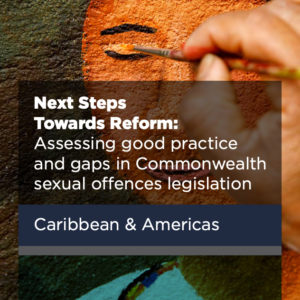The criminal law on sexual offences is contained in the Criminal Code 1920, [Chapter 3.01]. Saint Lucia last updated its Criminal Code in respect of sexual offences in 2004. The Evidence Act 2002 [Chapter 4.15] includes relevant provisions on evidence and procedure.
In a number of respects the Criminal Code does not meet good practice, especially by not criminalising marital rape (except in cases of separation, divorce and peace binding orders) and providing for lower penalties for such offences. The rules of evidence in sexual assault cases provide for some important safeguards for complainants, such as modifying the common law rules of evidence on corroboration and questioning on sexual history. However, these do not go far enough to sufficiently protect complainants. Amending these provisions would not undermine the rights of an accused to a fair trial, and they should be reformed.
There are specific child sexual assault offences. However, they are undermined or weakened by defences for marriage, regardless of the age of the child which can be as low as 12 years and inadequate close-in-age exceptions. These are necessary to protect children and young people from being criminalised when they engage in consensual sexual activity with their peers. The age of consent is 16 for heterosexual sexual activity.
Saint Lucia still criminalises consensual same-sex sexual activity. Laws that criminalise consensual same-sex sexual activity, such as ‘buggery’ and ‘sodomy’, should be repealed and all non-consensual sexual acts, including anal ‘rape’, should be included in the standard sexual assaults provisions, such as ‘rape’ and ‘sexual assault’, as well as in child sexual offences. All of these crimes should be gender-neutral.
Saint Lucia is a state party to relevant international and regional human rights treaties, including the Inter-American Convention on the Prevention, Punishment, and Eradication of Violence against Women (Convention of Belém do Pará), UN Convention on the Elimination of All Forms of Discrimination against Women, Convention on the Rights of the Child. It has signed but not ratified the Convention on the Rights of Persons with Disabilities and International Covenant on Civil and Political Rights. It has not ratified the Convention against Torture and Other Cruel, Inhuman or Degrading Treatment or Punishment.
Read more about the criminalisation of LGBT people in Saint Lucia.
The full assessment of Saint Lucia is available here.



